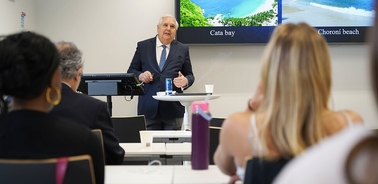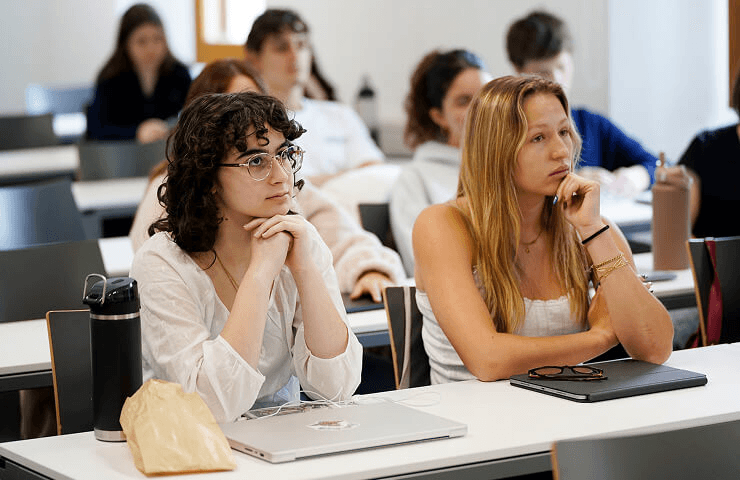A taste of history: Nikita Harwich guides IE University students through the world of chocolate

The historian and economist participated in the Global Consumerism: Past Present & Future series, an initiative organized by IE School of Humanities in collaboration with IE School of Politics, Economics and Global Affairs. Photo by Roberto Arribas.
Nikita Harwich, a French-Venezuelan historian specializing in economic history and Latin American commodity trade, visited IE University as a visiting scholar to trace the rich and complex history of chocolate. This event marked the launch of the Global Consumerism: Past, Present & Future series, with an inaugural session that included two lectures: the first one in IE University’s historical campus in Segovia, and the second in Madrid-based IE Tower.
In Segovia, Harwich, now a retired professor at Université Paris Nanterre and a member of the French Academy of Chocolate and Confectionery, gave a masterclass titled The Gentle Call of the Mysterious Cocoa Grove to a group of students from the Bachelor in Humanities and the Dual Degree in Business Administration and Humanities.
He began the lecture by reflecting on his native Venezuela, one of the world’s oldest cocoa-producing countries, and told the students how he started to conduct systematic research into cocoa production and trade, including historical statistics and original sources dating back to the 16th and 17th centuries, to finally write The History of Chocolate.
In his work, he explores key issues such as the role of slavery in cocoa plantations, the spread of chocolate consumption beyond Central America, and the expansion of "hotspots" across Europe. "Thanks to technical transformation following the Industrial Revolution, chocolate evolved from the powder used to prepare a heartening drink to the raw material that enabled the creation of a multiple-format solid sweet", said Harwich.
Big factories emerged, led by pioneering entrepreneurs like Henri Nestlé, Rodolph Lindt, Philippe Suchard, Richard Cadbury or Milton Hershey. During the 19th century, European powers also expanded cocoa cultivation to Africa, driven by new trade ambitions. Global consumption surged, turning chocolate into a multi-billion dollar company.
The session in Madrid was moderated by Manuel Lucena, Ph.D. in the History of Americas and an adjunct professor at IE University. Harwich introduced present-day issues, fortunes and eventual setbacks of chocolate as a globalized commodity. Today, Harwich noted, new challenges are emerging. West African countries now produce over 70% of the world’s cocoa, raising concerns about sustainability, labor conditions, and environmental impact.
Catalina Tejero, Dean of the IE School of Humanities, gave welcome words to kick-off the Global Consumerism: Past, Present & Future series organized by the IE School of Humanities, in collaboration with the IE School of Politics, Economics and Global Affairs. This series aims to examine the historical and economic impact of key global commodities, such as chocolate and coffee, through expert-led discussions.
